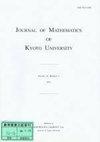线性随机演化的中心极限定理
Q2 Mathematics
引用次数: 11
摘要
我们考虑一个值为[0,$\infty$) $^{\mathbb{z}d}$的马尔可夫链。马尔可夫链包括一些有趣的例子,如定向位渗透,随机环境中的定向聚合物,以及二元接触过程的时间离散化。当$d\geq 3$和总体的平方可积性条件满足时,证明了“总体空间分布”的中心极限定理。这将已知的随机环境下定向聚合物的结果扩展到大类模型。本文章由计算机程序翻译,如有差异,请以英文原文为准。
Central Limit Theorem for Linear Stochastic Evolutions
We consider a Markov chain with values in [0,$\infty$)$^{\mathbb{z}d}$. The Markov chain includes some interesting examples such as the oriented site percolation, the directed polymers in random environment, and a time discretization of the binary contact process. We prove a central limit theorem for �the spatial distribution of population� when $d\geq 3$ and a certain square-integrability condition for the total population is satisfied. This extends a result known for the directed polymers in random environment to a large class of models.
求助全文
通过发布文献求助,成功后即可免费获取论文全文。
去求助
来源期刊
CiteScore
1.20
自引率
0.00%
发文量
0
期刊介绍:
Papers on pure and applied mathematics intended for publication in the Kyoto Journal of Mathematics should be written in English, French, or German. Submission of a paper acknowledges that the paper is original and is not submitted elsewhere.

 求助内容:
求助内容: 应助结果提醒方式:
应助结果提醒方式:


